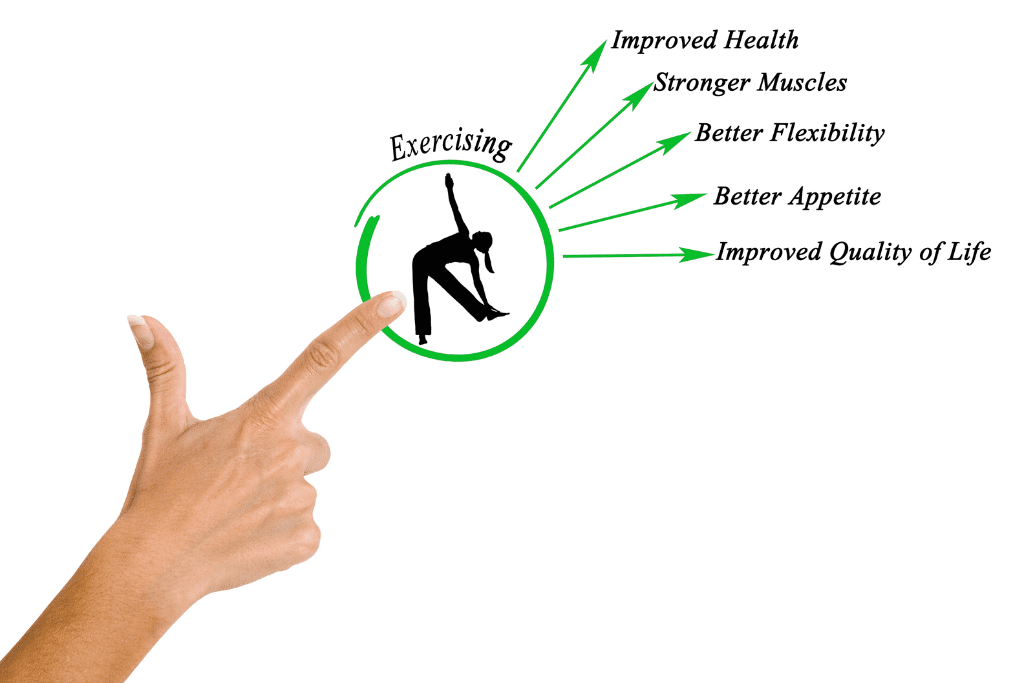Exercise has many benefits, including boosting your mood, improving your sleep, lowering stress, and increasing your heart rate. Whether it's in the form of aerobics or weight training, regular exercise can be beneficial for your health in a variety of ways. These benefits are the primary reasons to get up and move each day.


Exercise boosts mood
Exercise is an excellent way to improve your mood without the need for a clinical diagnosis. Regular exercise helps you focus on the moment and reduces the amount of time you spend thinking about problems. In addition, it helps you to release stress and anxiety. You can exercise on your own or with other people. In addition, you can enjoy the benefits of exercise without the cost of a gym membership.


Exercise improves mood by releasing endorphins, chemicals produced during physical activity. These chemicals help the body deal with pain and improve mood. The intensity of the exercise also affects the number of endorphins produced. Intensive exercises tend to hurt more than moderate exercises, so they may not be the best choice for those looking for a mood-boosting workout.
Exercise improves sleep
Researchers have long recognized the benefits of exercise, but it has been unclear exactly how it improves sleep. Previous studies have reported contradictory results. However, a new study conducted at the University of Tsukuba in Japan sought to examine how exercise affects sleep. This study shows that exercising regularly is beneficial for sleep, and it can also help prevent sleep problems. However, it is important to note that the effects of exercise on sleep are not immediate. Moreover, the quality of sleep after a workout can be impacted by muscle soreness and increased stress levels.


Exercise has several benefits for sleep, from improving sleep quality to improving sleep duration. In a recent study, subjects who took up resistance training had significantly improved sleep quality and duration. In addition, they also reported improved mood and quality of life.
Exercise reduces stress
Exercise is a natural way to relieve stress and anxiety, and it is an effective tool to manage your stress levels. Whether you're feeling stressed about money or a rough patch at work, exercise can help you get your mind off these concerns and improve your overall wellness. Many studies have shown that regular exercise reduces stress and anxiety.


Regular exercise lowers stress hormones and lowers blood pressure and sugar levels. It also helps fight mental health disorders, such as depression and anxiety. Exercise also elevates mood, which in turn makes you better able to handle stressful situations. Although anxiety disorders do not always disappear with exercise, they tend to improve.
Exercise lowers blood sugar
Exercise is an excellent way to stabilize your blood sugar levels. As muscles burn sugar, they take it out of the bloodstream and use it for energy. Therefore, the blood sugar level will be lower after exercise. People with diabetes must be careful to monitor their blood glucose levels while exercising. They also have to prepare differently for physical activity.


People with diabetes should consult with their physician before starting an exercise program. They may need to take insulin or take certain medications that affect blood glucose levels. Also, they should check their blood sugar levels before and after exercise. They should also ask their healthcare providers about the ideal range of blood glucose and make necessary adjustments to their medications. They should also carry some snacks in case of low blood sugar.
Exercise improves lung health
Exercising regularly improves lung health. It increases respiratory endurance, which means more oxygen in the lungs for metabolic processing. Moreover, regular exercise improves circulation, which strengthens the tissues surrounding the lungs. So, it is not surprising that exercise is a good way to keep your lungs healthy.


Exercise can also improve lung health if you're suffering from a lung condition. It strengthens your heart and lungs, allowing you to do your daily tasks and live a healthy life. However, you should speak with your healthcare team about the right exercise program for you. It's advisable to start slowly and gradually and to work out at a pace that does not overtax your lung condition.
Exercise prevents falls
There is a strong correlation between exercise and fall prevention. In fact, studies have shown that regular exercise can reduce the risk of falling by as much as 30%. However, exercise must be done in a structured manner in order to be effective. The best way to find out how much exercise you need is to consult a healthcare professional.


Research shows that physical activity can reduce the risk of falling in older adults. A recent Cochrane Review examined the effects of exercise on fall prevention. The Sherrington 2018 study found that well-designed exercise programs can reduce the overall rate of falls and fallers by up to a quarter.
Written by VeniVidiVideo
Tom K.
October 21, 2022 at 2:46 am
Thank you for this. I am sharing with my sister because need motivation…